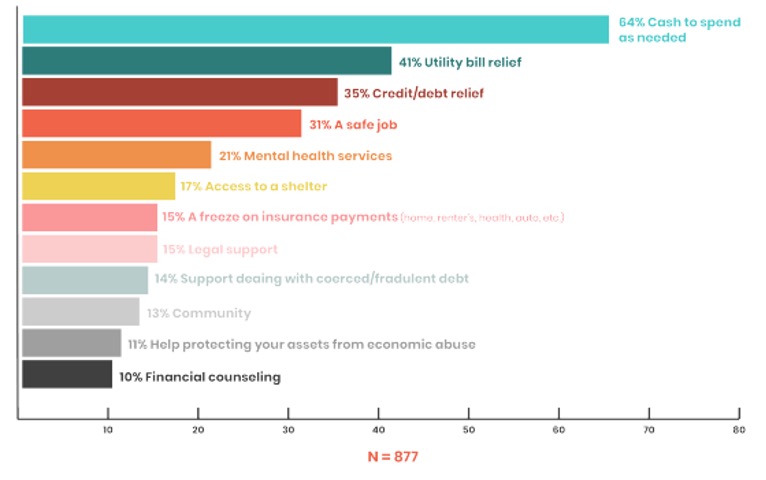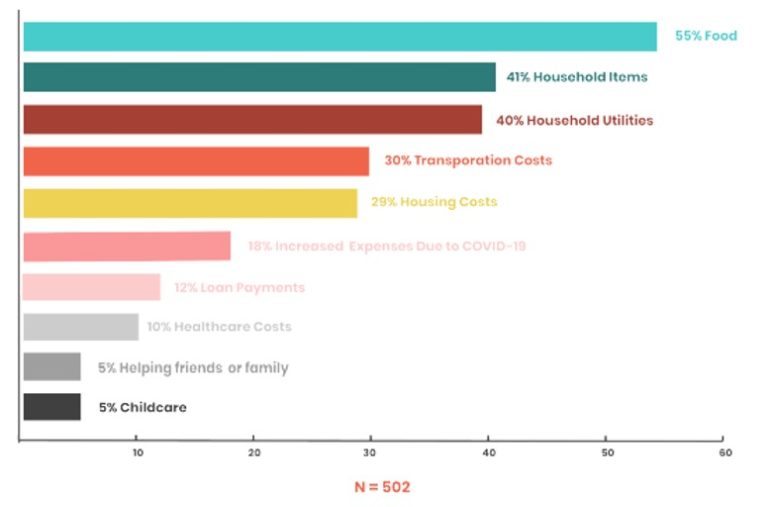Cash: A Lifeline for Domestic Violence Survivors
Domestic violence or intimate partner violence (IPV) is a behavior pattern that one person uses to maintain control and power over another in a relationship. It often occurs in a domestic setting, such as in marriage or cohabitation.
Domestic violence includes sexual, physical, emotional, and economic or financial abuse, stalking (or cyberstalking), and reproductive coercion. Women with low incomes, women of color, children, welfare recipients, people with disabilities, and LGBTQ people are some of the likeliest groups to experience domestic violence. The United Nations Population Fund (UNFPA) estimated that the Covid-19 pandemic would likely reduce progress toward ending gender-based violence over the next decade by one-third.
Economic Dimensions of Domestic Violence
“Having lack of access to cashMoney in physical form such as banknotes and coins. More is one of the ways in which women are financially controlled… it prevents a woman from leaving her perpetrator. It prevents her from being able to make choices she can because she hasn’t got access to funds… Cash is an essential kind of lifeline for women and children.” – Lisa King, Director of Communications at Refuge, the U.K.’s leading charity providing services to survivors of domestic violence.
Most domestic violence survivors experience economic abuse, financial stress, and hardship and are at risk of increased unemployment and homelessness. Harm-doers leave survivors with little to no income, no access to cash or bank accounts, fraudulent or coerced debt in their name, and damaged financial profiles.
According to MoneyGeek, financial abusers
- Control their partner’s finances and access to bank accounts
- Make threats over having a job of making moneyFrom the Latin word moneta, nickname that was given by Romans to the goddess Juno because there was a minting workshop next to her temple. Money is any item that is generally accepted as payment for goods and services and repayment of debts, such as taxes, in a particular region, country or socio-economic context. Its onset dates back to the origins of humanity and its physical representation has taken on very varied forms until the appearance of metal coins. The banknote, a typical representati... More
- Withhold money to buy personal items or essential goods
- Ask their partner to participate in illegal behavior (stealing, fraud).
- Involve their partner in poor financial habits (leaving bills unpaid, running up debit or credit card limits, asking others to pay for everyday expenses).
Cash Enables Survivors to Escape Harm-Doers
“What if we provided direct cash support to survivors before they reached a place of acute crisis? What if we listened to survivors, gave them the cash they say they need right now to stay safeSecure container for storing money and valuables, with high resistance to breaking and entering. More, and trusted them to spend it as needed?” – FreeFrom (2020: 53).
While cash assistance can help survivors build the stability they require, cash is most important for an individual to leave unhealthy relationships.
- A survivor should have an escape bag with clothes, cash, checkbooks, credit and debit cards, essential medications, and copies of important documents.
- If possible, survivors should also keep a cash stash somewhere safe.
FreeFrom’s Safety Fund: Cash Grants for IPV Survivors
Founded in 2016, FreeFrom is a California nonprofit promoting IPV survivors’ financial independence and literacy. In April 2020, FreeFrom launched a Safety Fund to support survivors during the Covid-19 pandemic, when domestic violence increased significantly due to stringent lockdowns.
“As a society we don’t trust survivors to spend money in the “right” way. Our team does not think there are “right” costs for survivors to cover—every survivor knows their circumstances best—and we hope understanding how survivors spent their Safety Fund grants is a powerful rebuttal to this baseless worry. Not only is giving survivors the cash they need and trusting them to spend it as they see fit the just thing to do in response to this societal problem, but it is also the quickest, most impactful, and cost-effective way to support survivors’ safety during COVID-19 and beyond.” – FreeFrom (2020: 13)
FreeFrom’s initiative was one of the few (if not the only) open-application, unrestricted cash grant programs for IPV survivors in the United States. The organization raised $266,128 via GoFundMe through August 2020, when it issued the report “Survivors Know Best. How to Disrupt Intimate Partner Violence During Covid-19 and Beyond.”
Cash Helps the Most
“Many survivors do not have bank accounts they can safely use. As a result, many survivors instead rely on cash.” – FreeFrom (2020: 20).
Most survivors reported experiencing economic abuse (96%), economic restriction (95%), and economic exploitation (94%); 77% reported harm-doers preventing or disrupting their ability to earn income (FreeFrom 2020: 10). Survivors reported losing an average of $23,076 of income yearly.
Pressing Needs
“After a particularly brutal beating, I finally fled my abuser and moved into a temporary emergency domestic violence shelter. I didn’t have any financial resources. I applied for the FreeFrom COVID-19 grant, and the cash enabled me to open a bank account and buy ‘work clothes.’ I recently got a new job, and my goal is to save up enough money to get an apartment and buy a car. The cash grant gave me the opportunity to be financially independent and leave an abusive situation.” – FreeFrom cash grant recipient (2020: 51).
Survivors reported having less than $250 in savings on average and needing $730 on an immediate basis to stay safe (FreeFrom 2020: 11). As Graph 1 shows, survivors’ top needs were unrestricted cash (64%), utility bill relief (41%), credit and debit relief (35%); 31% reported needing safe employment.
Graph 1. FreeFrom: Survivors’ Top Needs, 2020

Source: FreeFrom (2020: 45).
Most survivors spent their grants on food (55%), household items (41%), and household utilities (40%), as Graph 2 shows.
Graph 2. FreeFrom: How Survivors Spent their Grants, 2020

Source: FreeFrom (2020: 50).
This post is also available in:
![]()
